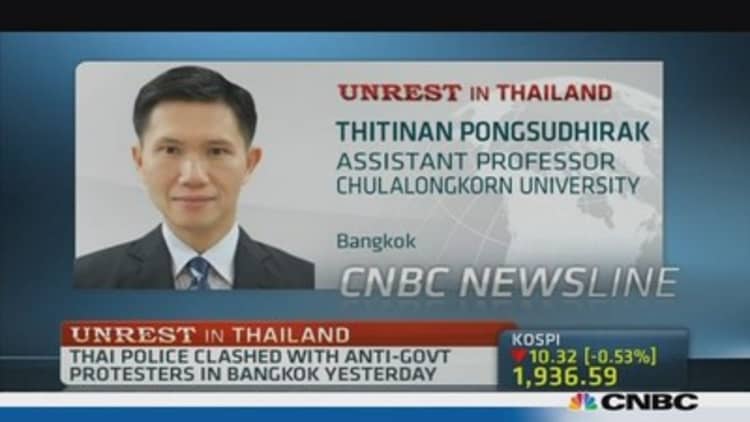A protracted political crisis in Thailand appears to be putting increasing strain on an economy that has proved resilient to turmoil in the past.
Data on Tuesday showed Thai imports fell 15.5 percent in January from a year earlier in the biggest slide since October 2009. Exports fell almost 2 percent from a year earlier after a rise of 1.9 percent in December.
Economists say that while seasonal factors may help explain the steep decline in imports, the overall message from recent Thai data is that the political unrest that began last November is taking a toll on Southeast Asia's second biggest economy.
(Read more: Thai PM leaves Bangkok as bombs, gunfire punctuate unrest)
"In previous years the economy has been resilient, but it does look like it is taking more of a hit from the political turbulence," said Fred Gibson, associate economist at Moody's Analytics in Sydney. "We have lowered our 2014 growth forecast from 5.2 percent before the unrest started last year to 3.2 percent and downward revisions are likely if the political situation does not improve."
Anti-government protesters hope to unseat Prime Minister Yingluck Shinawatra and disrupted a general election held earlier this month. The unrest in the Thai capital Bangkok has at times descended into bloodshed, with a bomb blast at the weekend killing a woman and young brother and sister.
Amid the political deadlock, infrastructure spending has been delayed and tourism has taken a hit.
The Thai Hotel Association said this month that occupancy rates in Bangkok were at around 50 percent, below the usual 80 percent at this time of year, Reuters reported.
(Read more: Thai tourism bane becoming a boon for rivals)
"This has been a protracted bout of instability, so it's not a surprise that Thailand's export machine is being impacted," said Tim Condon, head of research for Asia at ING Financial Markets. "Any country is vulnerable to political instability, but 2014 is shaping up to be a write off year for Thailand."
Thailand has been beset by political unrest since the ousting of former Prime Minister Thaksin Shinawatra, Yingluck's brother, in a 2006 military coup.

Too bearish?
Economists at OCBC Bank cautioned against taking an over-bearish view of the Thai economy following the latest trade data.
"We are comforted by the composition of its [Thailand's] exports, given that growth-related exports account for over 75 percent of total exports, and a likely uptick in global economic growth will support export growth," they said in a note.
Other analysts noted that the current unrest was taking place against a backdrop of Federal Reserve tapering and an environment where investors were more sensitive to political risk.
News last week that the Thai economy grew 2.9 percent last year, slowing sharply from a 6.5 percent growth rate in 2012, has fueled talk of a cut in Thai interest rates next month to help support growth.
(Read more: Rate cut talk growing in Thailand)
"A year of sub-par growth is the risk we are facing," said ING's Condon. "People won't invest and if you don't invest, you don't grow. That is the danger for Thailand."
— Writing by CNBC's Dhara Ranasinghe. Follow her on Twitter at @DharaCNBC


